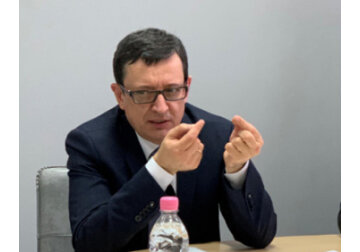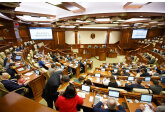
The level of foreign currency reserves is quite comfortable: it allows for 4.8 months of imports - Octavian Armasu.
This was stated by the Governor of the National Bank of Moldova (NBM) to reporters when asked how the regulator copes with the unprecedented reduction in the country's foreign exchange reserves. The head of the National Bank said that the optimal level of foreign exchange reserves is to provide imports for 3 months. "We are in a very comfortable zone. Besides, financing is expected from the foreign partners, I mean the cooperation program with the IMF, the programs supported by the World Bank and the EU partners. The government has already signed bilateral agreements with some EU partner countries," said the head of the NBM. Speaking about the foreign exchange interventions of the National Bank in the foreign exchange market, Armasu explained that they are dictated by market conditions. "NBM intervenes when there is a serious imbalance between supply and demand in the foreign exchange market. The equalization is done to prevent additional shocks that could result from a sharp change in the exchange rate. This allows for a slow and gradual adjustment of the exchange rate, without shocks," Armasu said. While speaking about the last few quarters, Armasu recalled that in the fall of 2021, when the "gas" crisis occurred and when it was necessary to buy gas for the heating season at unexpectedly high prices, the level of coverage of demand for foreign exchange by supply fell well below 30%. "Naturally, in such circumstances, the National Bank could not but intervene, so it intervened in the foreign exchange market, providing economic agents with currency from its reserves, so that they could buy energy resources and provide gas for the heating season. If the National Bank had not intervened at that time, we would have had a devaluation of the MDL. And even if the devaluation of the national currency was temporary, it would have been a very big shock that would have been felt by the whole economy and would have given rise to many other shocks, including in the banking market and the real sector. But most of all, it would have led to an even greater increase in gas prices," said the Governor of the National Bank. After the currency intervention of the National Bank, according to Armasu, the market is slowly adapting to the new conditions, without creating new shocks. At the same time, the head of the National Bank stressed that the NBM intervention allowed withdrawing about 7 billion lei from the market, the money supply was reduced and the liquidity in the market decreased, which is good for the mitigation of inflation effects. At the same time, Armasu stressed that as the market calms down, the National Bank starts buying currency again, replenishing reserves, such as what happened in January. But the situation changed again in February, when a new shock occurred - the military conflict in Ukraine, which provoked more nervousness in the market. "We saw withdrawals from deposits, and some economic agents and individuals converted their lei (MDL) deposits into foreign currency. To calm down the market and to cover the demand for foreign currency, the National Bank had to intervene again. And in the second half of March and in early April, we again found ourselves in a situation where the NBM was buying foreign currency from the market and replenishing the national currency reserves," pointed out Octavian Armasu. // 13.04.2022 - InfoMarket







